|
|
|
Sort Order |
|
|
|
Items / Page
|
|
|
|
|
|
|
| Srl | Item |
| 1 |
ID:
085394
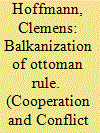

|
|
|
|
|
| Publication |
2008.
|
| Summary/Abstract |
The term `Balkanization' has found entry in the social sciences vocabulary as a metaphor for diversity at best, social and political instability for the most part, and genocidal war at worst. And yet it is precisely the emergence of a variety of national states and the Ottoman Empire's disintegration that are frequently portrayed as processes of `modernizing' as well as `naturalizing' the international system of the Balkans and the Middle East. By offering a historical sociological re-construction of early modern Ottoman history up to the Greek Revolt in 1821, I argue in this article that the national secessions were not synonymous with the creation of a `modern' international system in southeastern Europe
|
|
|
|
|
|
|
|
|
|
|
|
|
|
|
|
| 2 |
ID:
178212
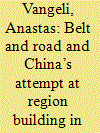

|
|
|
|
|
| Summary/Abstract |
This article analyses China’s Belt and Road as a medium through which novel regional development ideas and practices are being generated, (re)articulated, and diffused, via a case study of its implementation in the broader region of Central-East and Southeast Europe (CESEE). The example of CESEE shows that via the Belt and Road, Chinese actors have advanced comprehensive region work based on social interactions, which includes regular high-level diplomatic exchange and quasi-institutionalisation as well as people-to-people relations, resting on the potent geoeconomic imaginaries of the New Silk Roads. This approach, in the case of CESEE, has allowed for regional co-operation to advance even in times of friction and uncertainties. Nevertheless, as region work is essentially a contentious endeavour, China’s attempt at regionalism in CESEE has been challenged by the European Union (EU), the United States and regional actors who feel uneasy about China’s advance.
|
|
|
|
|
|
|
|
|
|
|
|
|
|
|
|
| 3 |
ID:
117819
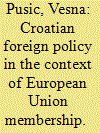

|
|
|
|
|
| Publication |
2012.
|
| Summary/Abstract |
In this essay, Croatia's minister of foreign and European affairs outlines Croatia's foreign policy directions as a member of the European Union. Mutual benefits to the EU and Croatia of the latter's membership are outlined, with particular reference to issues in southeastern Europe and with countries along the southern Mediterranean shoreline. The membership process itself is described as a driver in the development of Croatia's foreign relations.
|
|
|
|
|
|
|
|
|
|
|
|
|
|
|
|
| 4 |
ID:
095178


|
|
|
|
|
| Publication |
2010.
|
| Summary/Abstract |
This article suggests that EU governance in Southeastern Europe reproduces a discourse in which the failures and problems which have emerged, especially in relation to the pace of integration and the sustainability of peace in candidate member states such as Bosnia-Herzegovina, have merely reinforced the EU's external governance agenda. On the one hand, the limitations of reform have reinforced the EU's projection of its power as a civilising mission into what is perceived to be a dangerous vacuum in the region. On the other hand, through the discourse of post-liberal governance, the EU seeks to avoid the direct political responsibilities associated with this power. Rather than legitimise policy making on the basis of representative legitimacy, post-liberal frameworks of governance problematise autonomy and self-government, inverting the liberal paradigm through establishing administrative and regulatory frameworks as prior to democratic choices. This process tends to distance policy making from representative accountability, weakening the legitimacy of governing institutions in Southeastern European states which have international legal sovereignty but lack genuine mechanisms for politically integrating society.
|
|
|
|
|
|
|
|
|
|
|
|
|
|
|
|
| 5 |
ID:
137536


|
|
|
|
|
| Summary/Abstract |
We investigate the impact of the emergence of China as a global competitor on the trade performance of Central, Eastern and Southeastern European (CESEE) countries at the EU-15 market, i.e. the fifteen EU members as of 1995. The main aim of the paper is thus to challenge the common view that China crowds out exporters from European markets. The paper takes a comprehensive approach in terms of empirical methods and data. We analyze export growth, export market shares, extensive and intensive margins and the dynamics in the number of joint trade links (Dynamic Trade Link Analysis), applying highly disaggregated data at the 6-digit HS level over the period 1995–2010. We show that the most contested markets are those for capital goods and transport equipment, product categories where both regions have gained market shares and comparative advantage. We show that the number of trade links at the product level where both regions are active has increased substantially, indicating intensified competition. At the same time hardly any trade links were lost, which points against cut-throat competition between CESEE and China. The decomposition of export growth along the extensive versus the intensive margin shows that in line with the literature, the deepening of already existing trade relationships (i.e. the intensive margin) contributed most strongly to export growth in both regions, whereas the contribution of new trade links (i.e. the extensive margin) had only a minor contribution, apart from the instance of EU accession, which boosted the extensive margin considerably. We further decompose intensive margin growth into demand related structural effects and a supplier related competitiveness effect. Both the CESEE region and China successfully intensified their trade linkages above all as a result of their outstanding competitiveness as shown by the econometric shift-share analysis. While this suggests that both regions pursue a suitable export strategy, further diversification of production towards promising new industries and markets will become increasingly crucial for both, especially in face of projected slower EU-15 market growth in the longer run.
|
|
|
|
|
|
|
|
|
|
|
|
|
|
|
|
| 6 |
ID:
085310
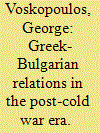

|
|
|
|
|
| Publication |
2008.
|
| Summary/Abstract |
The Balkan Peninsula has been an unstable regional security subsystem because of a number of defining and qualitative parameters, namely, overt or covert challenges to the territorial status, interethnic conflicts, the "great idea" syndrome, out-of-system interference, and minority expansionism. In the post-Cold War era, European Union enlargement in the area assisted the establishment of a core of systemic stabilizers that could, under certain conditions, absorb inherent instability. Greece and Bulgaria constitute an axis providing eufunctional input to the regional stability and security equation. Their partnership has been an example of inter-Balkan cooperation and an effort to establish an equilibrium mechanism to enhance the cohesion of the region
|
|
|
|
|
|
|
|
|
|
|
|
|
|
|
|
| 7 |
ID:
090978


|
|
|
|
|
| Publication |
2009.
|
| Summary/Abstract |
Talk of a "greater" this or that Balkan nation-state has subsided in recent years as the region experienced the creation of ever more minirepublics-a total of eight on the territory of former Yugoslavia. This trend toward fragmentation was initiated by petty nationalists and fostered by the United States and European powers that found it convenient and desirable to dominate and exploit a bunch of fiefdoms. The outside powers reinforced the new system of minirepublics by inviting candidacy in their continental economic organization, the European Union, and their now global security organization, the North Atlantic Treaty Organization. But is "greater" gone forever from the Balkan vocabulary? It might be prudent not to banish the concept. Think of the phrase of the late Willy Brandt spoken in 1989: "Jetzt wächst zusammen was zusammen gehört"-"Now grows together what belongs together." Applied to the Balkans in coming decades the ethnic Albanians now living in at least five Balkan states and the ethnic Serbs living in five states, as well, are developing growing kinship with their fellow nationals beyond the current frontiers and local allegiances that currently separate them.
|
|
|
|
|
|
|
|
|
|
|
|
|
|
|
|
| 8 |
ID:
170989
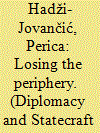

|
|
|
|
|
| Summary/Abstract |
Between the 1935–1936 Abyssinian crisis and the 1938 Munich conference, Britain’s interests in the Balkans and its relationship with other Great Powers limited British policy towards Yugoslavia. This analysis points to a higher level of British influence in Belgrade in the mid-1930s than is usually recognised in the historiography and argues that by not responding adequately to security challenges in the Balkans after the withdrawal of French influence from the region, Britain contributed to a power-vacuum for Germany to fill. As the British position in Southeastern Europe weakened after summer 1936 due to advancing Italian and German penetration, Yugoslavia’s importance grew in the eyes of Foreign Office officials. However, Britain’s position in Belgrade eroded to such a degree by late 1938 that Yugoslavia was no longer willing or able to offer any assistance in the event of war. This examination provides a better understanding of Britain’s interests in Southeastern Europe by highlighting the geo-strategic importance of Yugoslavia and the Balkans as a buffer zone to Central Europe and a flank of Britain’s Mediterranean routes when the balance of power in the continent was disturbed to British disadvantage.
|
|
|
|
|
|
|
|
|
|
|
|
|
|
|
|
|
|
|
|
|